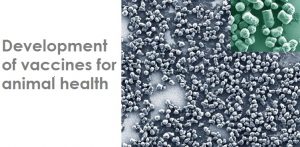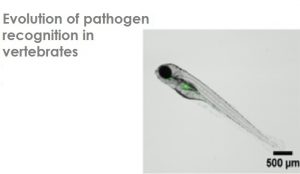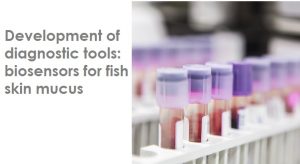Using a combination of molecular, in vitro and in vivo methodologies we aim to understand host-pathogen interactions and how we can modulate the host immune system to have a good performance against pathogens. We develop our research using zebrafish as a model organism due to its high versatility and the availability of mutants. We do both basic and translational research on fish immunology in three main areas:



 A central focus of our work has been the development of vaccines for fish species of commercial interest. We are searching for non-toxic, non-stressful and effective systems to protect commercial fish from diverse pathogenic challenges. The development of sustainable aquaculture is a strategic sector to feed the ever-increasing human population and disease prevention is mainly achieved through the implementation of preventive immunostimulation and effective vaccination strategies. Taking into account the particularities of the fish immune system, fish immunologists faced now a major challenge trying to prevent the massive economic losses caused by viral diseases. Our approach is based on protein nanoparticles made with relevant viral antigens that will induce a good and sustained immunization through the intestinal mucosa.
A central focus of our work has been the development of vaccines for fish species of commercial interest. We are searching for non-toxic, non-stressful and effective systems to protect commercial fish from diverse pathogenic challenges. The development of sustainable aquaculture is a strategic sector to feed the ever-increasing human population and disease prevention is mainly achieved through the implementation of preventive immunostimulation and effective vaccination strategies. Taking into account the particularities of the fish immune system, fish immunologists faced now a major challenge trying to prevent the massive economic losses caused by viral diseases. Our approach is based on protein nanoparticles made with relevant viral antigens that will induce a good and sustained immunization through the intestinal mucosa.
 The evolution of pathogen recognition in vertebrates is also matter of interest of our research. In the last years we have been investigating the molecular basis of the fish and cephalochordates immune system, and we have been trying to decipher the particularities of its innate immune response. We are interested on Pathogen Recognition Receptors (PRRs) and specifically on Toll-like Receptors (TLRs) and in the role and biology of macrophages after pathogen exposure.
The evolution of pathogen recognition in vertebrates is also matter of interest of our research. In the last years we have been investigating the molecular basis of the fish and cephalochordates immune system, and we have been trying to decipher the particularities of its innate immune response. We are interested on Pathogen Recognition Receptors (PRRs) and specifically on Toll-like Receptors (TLRs) and in the role and biology of macrophages after pathogen exposure.
 Mucosal immunity in fish has been shown to be a central part of the host response. In the context of the fish mucosal immunity the gut and the skin mucosa are extremely important. We take advantage of the high production of mucus by the fish skin to use mucus to monitorize fish health. Mucus composition is a direct reflex of fish internal physiological status and we develop biosensors based on lateral flow approach to test different metabolites in skin mucus.
Mucosal immunity in fish has been shown to be a central part of the host response. In the context of the fish mucosal immunity the gut and the skin mucosa are extremely important. We take advantage of the high production of mucus by the fish skin to use mucus to monitorize fish health. Mucus composition is a direct reflex of fish internal physiological status and we develop biosensors based on lateral flow approach to test different metabolites in skin mucus.